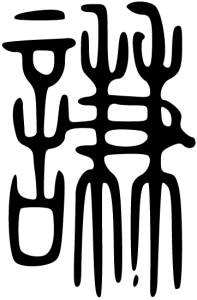
I asked,
“What is it about Yi that makes it precious as a spiritual ‘tool’?”
And received Hexagram 15, Integrity, with no changing lines:
This is one of those answers that gives me an immediate glow of recognition – and then unwraps like a gift, with more and more shining layers.

The name of Hexagram 15 is made up of two components: ‘words’, and ‘uniting’. ‘Uniting’ shows a hand holding two things – two grain-stalks, perhaps – close together. So we have an oracle of uniting words, that hold close to reality. This is a very realistic hexagram overall: for me, it generally comes up when some overblown idea or swelling self-image needs swiftly deflating back to ‘actual size’. For others, it can point to a need not to devalue themselves. But either way, it seems to me to echo what the oracle does as a whole: unite us with how things really are.
On the one hand this is about getting an objective view, a wider perspective. We’re living in the middle of the drama, in the full intensity of the moment; a reading can take us from centre stage to audience for a moment, where we can get a sense of the broader sweep of the story, and realise that the world under the lights isn’t all there is.
There’s a mountain in the centre of the earth, says the Image – and there’s also a great deal of earth above, around and beyond the mountain, setting it in context. We can ‘weigh things up to even out their distribution.’ One facet of the jewel in the oracle is surely this sense of balance.
So a reading is objective – but on the other hand, it’s also irreducibly subjective. Other people can help you interpret it; no-one else can experience its meaning for you. It’s yours – from the ‘uniting oracle’.
The right-hand part of the name of the hexagram is ‘uniting’. On the left, ‘words’, indicating ‘uniting words’ that mean integrity or humility. Some scholars believe that the name originally referred to a ‘uniting rodent’ (more on that here): Yi brings you face to face with your own image, a vivid and simple reflection of your essential nature. Another facet is the experience of recognition.
Insight, recognition, perspective, balance, uniting… all parts of why Yi is precious, but not the whole picture.
‘Integrity, creating success.
The noble one completes it.’
The noble one won’t be suffering from an inflated sense of his own importance, so he won’t attempt everything and end up realising nothing. He also won’t be underestimating his own importance, so he needn’t wait for validation or permission to do what’s his to do.
I didn’t like including the word ‘tool’ in my question; I just couldn’t think of a better one. But Yi doesn’t seem to object to it so much. The oracle is precious because it equips and allows us to do the work.


The Chinese put a great deal of emphasis on humility in their society, so much opposite the western society that respects, well, arrogance. The universe is a, let’s say, for want of a better word, a bipolar experience. And in terms of bipolarity, we have on one pole, the concept of “rugged individualism,” and on the other pole “relationship orientation.” I do not mean to value or devalue one over the other, they both have their place, and we must make use of both ways of thinking. Astrokogically speaking, Aries represents “rugged individualism,” and Libra represents the relationship perspective. In human terms, men in general, are more reflective of the “rugged individual,” and as such are not so inclined to show emotions, or even have respect for those that would, as they think that each person ought to take care of, and be responsible, for themselves. Women, in genaral are more inclined to see themselves as part of a greater whole, and concern themselves with how they fit into society as a whole. Both perspectives are necessary and are needed.
The I Ching is counselling us in hexagram 15 to recognize our place in the overall scheme of things. It is telling us to take into consideration our partner. It is telling us to overcome tendencies of separateness and one upmanship. It uses the example of a pair of eyes, that together can process within the brain properly spacial realities.
For some reason my keyboard posted my note before I even began to finish. I have no clue why, so I will try to finish up here. Together we are more than we would be separately. By working harmoniously, we can accomplish a task so much the easier. It multiplies are potential rather than just doubling it.
On the cosmic level, the I Ching counsels us to work with it. It counsels us to be humble in our relationship to it. We often think we are above it. We don’t like its advice, or continue to question it. The I Ching is a living entity. It is not just a book. It is alive and aware, and recognizes our attitude. If our attitude is not correct, it counsels us on it. If we are arrogant, it warns us of the danger of hubris.
A side note here. In our society, arrogance and self confidence are often confused. Both sexes are guilty of this, but I especially notice it when women say they want men who are confident, but don’t realize arrogance is not confidence, it is a coverup for a lack of confidence. A truly confident person is never going to “act” confident, or do anything that would call attention to who he is or his special talents. When we approach the I Ching we are approaching our “superior.” We are approaching the one who has “the keys to the kingdom.” It is time we recognize this, and show the due respect. If we do not respect the I Ching, it will not respect us, and will not release to us the true “keys of the kingdom.” The I Ching is a living entity. It is the universe itself, in all its facets, and it teaches us every aspect of the nature of the universe. But only if we prove worthy.
Gene